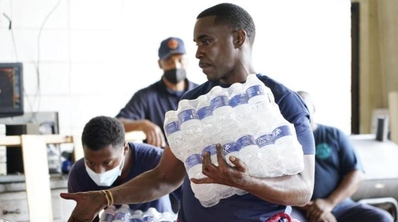The state of Mississippi has called upon its National Guard to assist in the distribution of water to tens of thousands of residents of Jackson following the breakdown of a long-beleaguered water treatment plant, which has left the majority of the state capital without access to clean running water for potentially several days.
On Tuesday, Governor Tate Reeves announced a state of emergency for Jackson and the villages that surround it. He also issued a warning to the area’s 180,000 residents to refrain from drinking water from their taps.
Additionally, he activated the state’s National Guard to aid with relief operations for the city, which was devastated by record rains and floods over the past weekend. The city was hit by these natural disasters on Saturday.
The city reported that at many locations, both non-potable water delivered by tankers and drinking water delivered in bottles were made available to the public.
On Monday, the treatment facility at OB Curtis suffered a breakdown as a result of floods penetrating its inadequately manned and badly maintained facilities.
On Tuesday, a crisis response team had the facility operating at forty percent of its capacity, according to the senior state health officer Jim Craig.
However, the system did not have adequate water pressure to assure service across the whole city.
Officials said that they were unable to provide an estimate of the number of residences that had their power switched off.
Businesses were thrown into disarray as a result of the closure, and the Jackson public schools, which serve roughly 21,000 pupils, were had to relocate their classrooms online, much as they had done during the coronavirus outbreak.
The residents of Jackson have been vocal about their dissatisfaction with their water supply for some time now.
The majority of residents in Jackson, Mississippi, were without running water for a short period of time in February 2021 due to a series of winter storms, and the United States Environmental Protection Agency (EPA) had previously issued an urgent order stating that the water supply may have contained E. coli.
In 2016, consumers were informed that there were excessive levels of lead in the city’s water supply, which was caused by persistent incorrect treatment practises.

